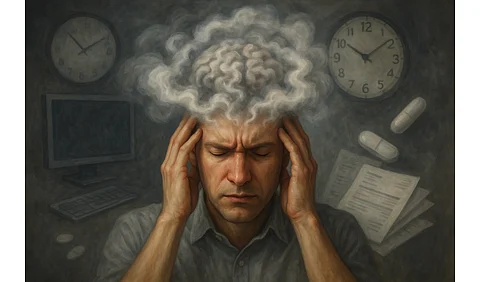Key Causes
Chronic stress: Persistent stress overloads the brain’s coping mechanisms, leading to mental exhaustion. As doctors explain, when your brain runs out of mental energy, it struggles to focus or process thoughts clearly.
Poor Sleep: With modern schedules and excessive screen time, many are failing to achieve the recommended 7–9 hours of restorative sleep. This deficit leaves the brain foggy and unfocused.
Adding to this, a large-scale 10-year study recently published in The Journal of Prevention of Alzheimer’s Disease has found that individuals with a natural tendency to stay up late – commonly referred to as "night owls" – may be at greater risk of cognitive decline if they are forced into early-morning routines. The study followed nearly 24,000 adults and found that this mismatch between biological rhythm and daily schedule, termed “social jet lag,” could impair brain function over time. The researchers identified poor sleep quality and smoking as key factors explaining this link. The findings suggest that long-term disruption of natural circadian rhythms may gradually wear down mental clarity.
Post-COVID effects: A significant number of people recovering from COVID‑19 – around 25–30% – continue to report lingering cognitive issues such as forgetfulness, confusion, and mental fatigue, symptoms now grouped under what is widely known as long COVID.
In a recent clinical trial published in JAMA Network Open, researchers tested the use of low-dose lithium aspartate to treat these long COVID-related symptoms. The dose used in the study (10–15 mg/day) was based on anecdotal reports but ultimately found to be ineffective in reducing fatigue and cognitive dysfunction. However, a small dose-finding arm of the study, which included only five participants, suggested that higher doses of lithium, resulting in serum concentrations between 0.18–0.49 mEq/L, might offer some symptom relief. Due to the small sample size and lack of randomization, the authors emphasized the need for larger, controlled trials to better assess lithium’s potential role in treating brain fog associated with post-COVID conditions.
Nutritional deficiencies: Diets low in essential nutrients – especially vitamins B12, D, omega‑3 fatty acids, iron, and magnesium – are common in India and can directly impair cognitive performance.
Lifestyle and environmental factors: Sedentary habits, extended screen exposure, hormonal changes, and environmental stressors further erode mental clarity.


